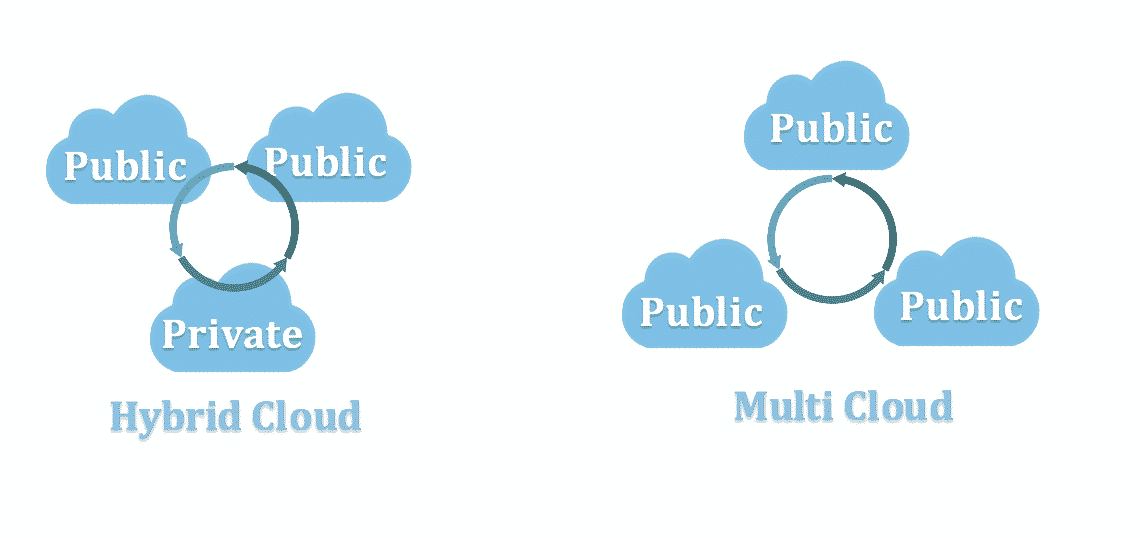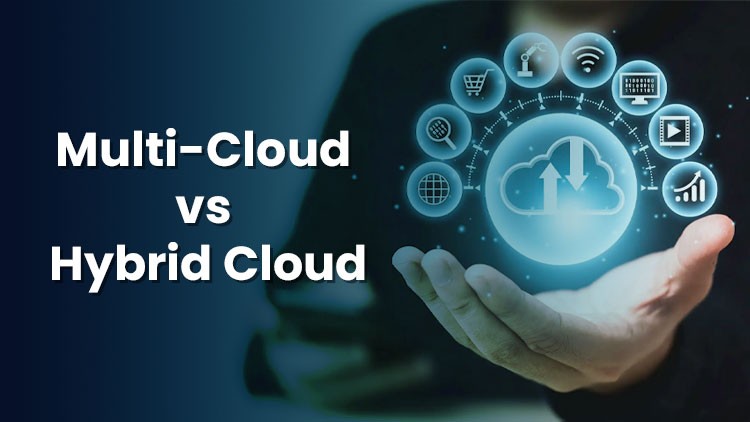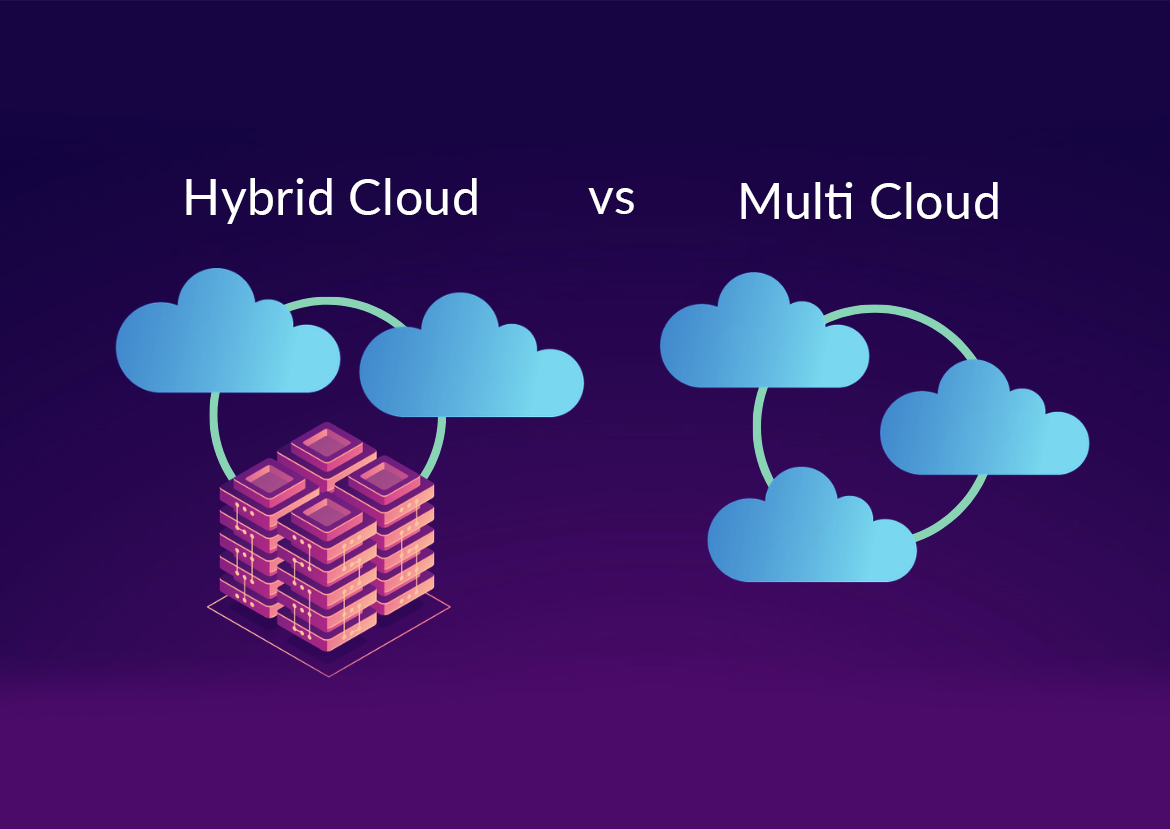The cloud has revolutionized computing, offering businesses unparalleled flexibility, scalability, and cost efficiency. But with choices like multi-cloud vs hybrid cloud, navigating this landscape can be daunting. This article explores the intricacies of both models, analyzing their advantages and challenges to equip you for informed decision-making. We’ll review the main distinctions between the two, identify the significant variables affecting cloud adoption, and point you toward the ideal cloud solution for your business requirements.
I. Overview of Multi-Cloud vs Hybrid Cloud
Multi-cloud
Multi-cloud is a strategic use of multiple cloud computing services from different providers. In this model, organizations leverage the strengths of various cloud platforms simultaneously to optimize performance, mitigate risks, and enhance flexibility. The essential characteristic of a multi-cloud setup is the distribution of tasks across different cloud environments.
| Advantages | Challenges |
|---|---|
| One significant advantage of a multi-cloud strategy is avoiding vendor lock-in, enabling organizations to choose services that best fit their specific requirements. Additionally, it offers improved redundancy and resilience, as it can distribute applications across various cloud providers and geographical regions. | However, managing multiple cloud services can pose challenges regarding complexity, interoperability, and potential security concerns. Coordinating data and applications seamlessly across diverse platforms requires robust planning and execution. |

Hybrid Cloud
A hybrid cloud integrates on-premises infrastructure with public and private cloud services, creating a unified, flexible computing environment. This model allows organizations to maintain specific workloads or sensitive data on-premises while leveraging the scalability and cost-effectiveness of the cloud for other tasks. A hybrid cloud benefits businesses with variable workloads and specific regulatory or compliance requirements.
| Advantages | Challenges |
|---|---|
| One notable advantage of a hybrid cloud is optimizing costs and resource utilization by dynamically scaling workloads between on-premises and cloud environments. Moreover, it provides a seamless pathway for businesses to transition gradually to the cloud without disrupting existing operations. | However, managing a hybrid environment requires careful coordination between on-premises and cloud components, and ensuring data consistency and security across both domains can be challenging. Organizations need to implement effective governance policies and integration solutions to realize the benefits of a hybrid cloud architecture fully. |
For more articles about Cloud, check these out:
II. Difference Between Multi-cloud and Hybrid Cloud
What is the difference between hybrid cloud and multi-cloud? See the table below for an overview of their main differences.
| Criteria | Multi-cloud | Hybrid cloud |
|---|---|---|
| Cloud type | Public, private cloud, or combination | Always includes public cloud and private cloud. |
| Purpose | Leverage advantages of multiple providers | Combine benefits of public cloud and private cloud. |
| Distributed | Distributed or integrated. | |
| Management | More complex | Generally simpler |
| Cost | Varies depending on the provider and services | Higher than multi-cloud. |
| Security | Require specific strategies for each platform | Require a unified security control. |
| Compliance | Strict oversight to ensure compliance across diverse data locations. | Regulatory negotiation between public and private clouds. |
#1. Cloud Type
The fundamental distinction between hybrid cloud vs multi cloud is their composition in cloud computing. Multi-cloud configurations can manifest as an amalgamation of public clouds, private clouds, or a combination of both. Conversely, the hybrid cloud model consistently involves the integration of a public cloud with a private cloud.
#2. Purpose
Utilizing the competitive pricing, a wide range of features, and services multiple cloud providers offer is why multi-cloud configurations are so popular. This strategy works well for companies looking for flexibility in choosing the best-in-class solutions for their unique requirements or companies evaluating disaster recovery capabilities from various suppliers.
Conversely, the hybrid cloud paradigm combines the intrinsic advantages of public and private clouds. This feature could entail leveraging the public cloud’s scalability and flexibility while retaining a private cloud’s privacy and control features.
#3. Architecture
Typically, multi-cloud configurations have a distributed architecture in which each cloud operates independently. Although this decentralized structure allows for independent operation, it may also add complexity to data management and orchestration.
On the other hand, distributed or integrated hybrid cloud architectures are also possible. Public and private cloud resources are combined more smoothly in an integrated architecture to create a cohesive environment. Thanks to architectural flexibility, businesses can customize their cloud infrastructure to meet particular operational needs.

#4. Management
Managing multiple clouds is a complex process that requires advanced tools and procedures to navigate the various environments offered by different providers effectively.
Although there are still difficulties in hybrid cloud management, most people agree that it is generally simpler than multi-cloud management. The interconnectedness of public and private clouds, which enables a more unified approach, is credited with this relative ease.
#5. Cost
Multi-cloud expenses are by their very nature erratic, depending on the particular set of suppliers and services. This flexibility enables companies to optimize expenditures to their specific needs. On the other hand, although they can also vary, hybrid cloud prices are typically more than those of multi-cloud solutions. The additional infrastructure and management overhead needed to integrate public and private clouds are the leading causes of this higher cost.
#6. Security
Cloud computing security is critical, and multi-cloud and hybrid cloud models require strong security measures to protect applications and data. Security management becomes complex in a multi-cloud environment because it necessitates specific strategies for every cloud platform. The problem is keeping a unified and uniform security posture across the various provider landscapes.
Security protocols must consider how public and private clouds interact in a hybrid cloud. The benefit in this case is the possibility of unified security control using both environments’ security features.
#7. Compliance
Due to the distributed nature of data and applications, this task becomes more complex in multi-cloud and hybrid-cloud environments. Strict oversight is necessary in multi-cloud setups to guarantee compliance across various locations where data may reside.
Similarly, in a hybrid cloud context, the difficulty is in negotiating the regulatory environment as data and apps move between public and private clouds.
III. Essential Factors When Choosing the Best Cloud Solution for Your Business
Workload Requirements
To begin, conduct a comprehensive analysis of your workloads, considering factors such as computational power, storage, and network speed. Different cloud providers exhibit varying degrees of specialization; some may excel in high-performance computing, while others may be better for data-intensive tasks. By understanding your workload intricacies and provider strengths, you can make an informed choice that aligns seamlessly with your application requirements.
Data Security and Privacy
Start by examining the geographical locations of the cloud provider’s data centers to ensure alignment with your data residency requirements. Additionally, verify that the chosen cloud solution complies with industry-specific regulations governing data security and privacy in your sector.

Cost Management
Effectively managing costs is crucial for any business utilizing cloud services. Evaluate cloud providers’ pricing structures, considering pay-as-you-go, reserved instances, and data transfer costs. Explore the availability of optimization tools each cloud service provides to fine-tune resource allocation and minimize unnecessary expenses.
Reliability
Reliability and uptime are critical for uninterrupted business operations. Scrutinize potential cloud providers’ Service Level Agreements (SLAs) to understand uptime, performance, and support commitments. Additionally, to guarantee service availability, assess the redundancy mechanisms, including data backups, failover strategies, and distributed data centers.
Integration
Ensuring seamless integration with your existing infrastructure is paramount. Evaluate the compatibility of each cloud solution with your databases, applications, and networking protocols. Consider the robustness of cloud providers’ application programming interfaces (APIs) to facilitate smooth integration with third-party services and tools. This compatibility assessment ensures a cohesive and interconnected IT environment, reducing potential disruptions and enhancing overall efficiency.
Conclusion
Hybrid cloud vs multi cloud offers exciting possibilities for businesses seeking scalability, agility, and cost efficiency. This comprehensive guide has highlighted the critical differences between these approaches, helping you determine the optimal solution for your unique needs.
Ready to unlock the power of the cloud? Contact TECHVIFY, your trusted cloud partner. Our team of experts will guide you through every step of your cloud journey, from initial assessment and strategy development to seamless implementation and ongoing support.
Don’t let cloud confusion hold you back. Schedule a free consultation with TECHVIFY today and discover how we can empower your business to thrive in the cloud era.
TECHVIFY – Global AI & Software Solution Company
From Startups to Industry Leaders: TECHVIFY prioritizes results, not just deliverables. Accelerate your time to market and see ROI early with high-performing teams, AI (including GenAI) Software Solutions, and ODC (Offshore Development Center) services.
- Email: [email protected]
- Phone: (+84)24.77762.666





